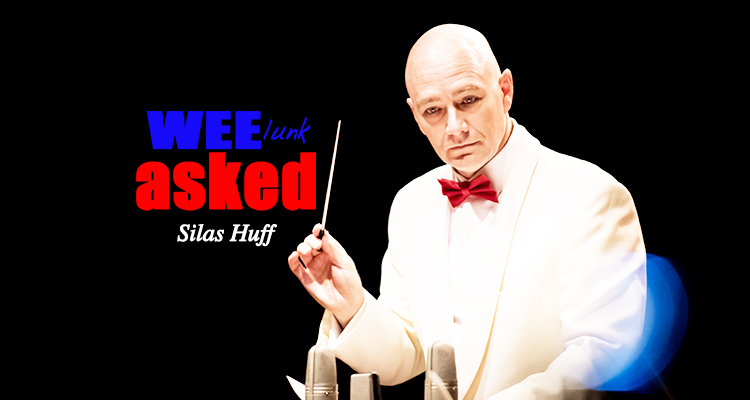Editor’s note: We are changing up our WEEasked series a few times over the next several months, asking specific questions to the candidates vying for the position of Wheeling Symphony music director. There are five music directors in the running, and each will have a shot at answering the same questions, with the answers posting a few days before their concert.
Self-proclaimed rebel Silas Huff fancied himself a rock star while growing up in Texas, but while in college, he surprisingly fell in love with classical music and took up composition — it was too late, he decided, to start learning a new instrument. Then he discovered he had a knack for conducting.
A conductor, teacher, producer and composer, he’s had an eclectic career over the years and has lived across the country and around the world. He loves to travel, is an espresso snob and enjoys biking when time allows.
He also loves big band and country music, the blues, and “there’s still a soft spot in my heart … for 1980s rock-n-roll,” he says.
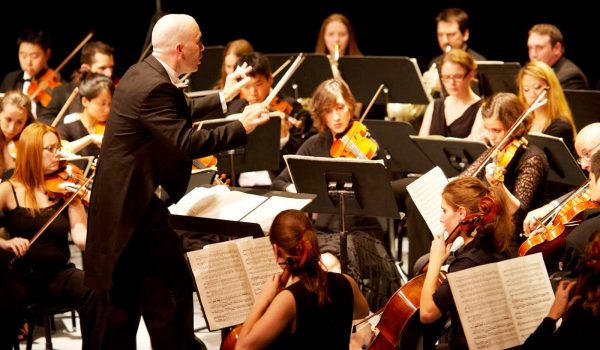 Huff will be conducting “Superheroes!” with guest vocalists Megan Pachecano and Colin Eaton, at 7:30 p.m. Friday, Jan. 18, at The Capitol Theatre in Wheeling. He invites audience members to wear their favorite superhero costumes! Also, there will be a tribute to real-life superheroes — the men and women of the U.S. armed forces.
Huff will be conducting “Superheroes!” with guest vocalists Megan Pachecano and Colin Eaton, at 7:30 p.m. Friday, Jan. 18, at The Capitol Theatre in Wheeling. He invites audience members to wear their favorite superhero costumes! Also, there will be a tribute to real-life superheroes — the men and women of the U.S. armed forces.
Get to know Silas Huff. Here’s what he answered when WEEasked:
Tell us about yourself. Include a brief biography, sharing some highlights of your professional career, training and education.
I was born and raised in San Antonio, Texas, where I played guitar in my high school’s jazz band. Always a rebel, I started a couple of rock bands on the side. Although I wanted to be a rock star, I’m glad my dad shrewdly convinced me to go to college … just in case. I attended Texas State University and earned a degree in classical guitar performance (they didn’t offer a degree in rock-n-roll) — and while taking music theory, history and literature, a strange thing happened. I fell in love with classical music, specifically the sound of the orchestra. At age 19 or 20, it was too late for me to take up a new instrument, so I took up composition. If I couldn’t play orchestral music, I’d compose it.
I moved to Los Angeles to study music composition at UCLA, and another amazing thing happened. I was required to take a conducting class and, low and behold, I had a knack for it! I completed my master of arts degree in music composition and then dedicated myself to studying conducting. I worked a little as a conductor and taught high school music (theory, band and orchestra), and I studied … a lot. I took lessons, watched rehearsals, attended conducting workshops and symposiums, and finally spent a year studying in Germany, the homeland of classical music. It changed my life. After that, I moved to New York City … there was a lady there (now she’s my wife), and it seemed like a good place to go to start a career in music. In New York, I founded and conducted the Astoria Symphony Orchestra in Queens, taught music, produced operas at the Manhattan School of Music, started the International Conducting Institute (an organization dedicated to training conductors) and built my career the old-fashioned way — with slow, steady determination, one musical project after another.
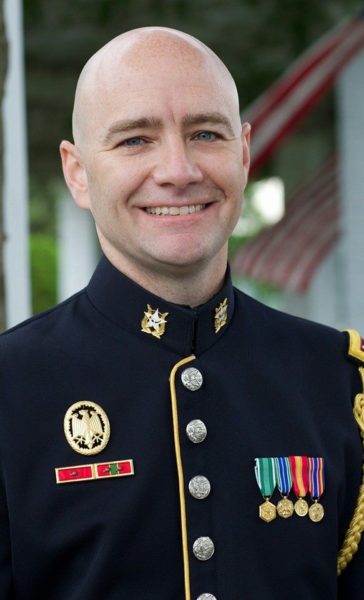 In 2011, the U.S. Army offered me a remarkable job opportunity. I became a commissioned music officer, a conductor of military music. I worked with some of the best musicians in America and conducted concerts at high-profile venues like the U.S. Capitol Building, Arlington National Cemetery and the National Mall. I directed the U.S. Army Band “Pershing’s Own” and the U.S. Army Orchestra. I spent time in the Middle East supporting musical missions for American and NATO troops, the State Department and local populations. I ended up the company commander of the U.S. Army School of Music in Virginia Beach. I had a good run, but after seven years on active duty, I decided to go back to civilian music-making.
In 2011, the U.S. Army offered me a remarkable job opportunity. I became a commissioned music officer, a conductor of military music. I worked with some of the best musicians in America and conducted concerts at high-profile venues like the U.S. Capitol Building, Arlington National Cemetery and the National Mall. I directed the U.S. Army Band “Pershing’s Own” and the U.S. Army Orchestra. I spent time in the Middle East supporting musical missions for American and NATO troops, the State Department and local populations. I ended up the company commander of the U.S. Army School of Music in Virginia Beach. I had a good run, but after seven years on active duty, I decided to go back to civilian music-making.
Now I live in Boulder, Colorado, where I direct the University of Colorado Boulder Campus Orchestra and the Boulder Concert Band, and I teach music theory at the university. I still direct the Astoria Symphony Orchestra in NYC, and I guest-conduct around the country when I can. One weekend a month, I still wear the Army uniform as the commander of the 44th Army Band — New Mexico’s Army National Guard Band in Albuquerque.
Tell us something personal you’d like your audiences to know about you.
I give so much time to music that there is little time for hobbies, but I love bicycling. I bike as often as possible and compete (for fun) in triathlons. I understand there are wonderful Wheeling Heritage Trails that I hope to ride one day. I have completed a number of international-length triathlons (roughly one-fourth an IronMan), and I have an unshakeable delusion that one day I’ll complete a full IronMan. Time will tell. I also enjoy woodworking, hiking and camping, and I love wildlife and nature in general.
I love traveling. I travel for work often, and when I have free time, I love to take road trips, hiking and camping trips, or just fly someplace I’ve never been before. Also, I’m absolutely nuts about great espresso, and I’m quite finicky about it. My Instagram is full of photos of espresso I’ve had in various exotic locales around the world.
How do you see yourself incorporating the changing landscape of orchestral music with the Wheeling Orchestra?
I am optimistic about the future of orchestra music but, like everything else in life, orchestras must evolve, and it’s possible to do that without losing their essential character. Making great music will always be the most important objective of orchestras, but the methods we employ to engage audiences can change. Have you ever ordered dinner at one of those fancy restaurants with an iPad on the table? Or have you ever visited a museum with one of those little audio gadgets that tell you about the works of art you are seeing? A restaurant’s mission is to make great food, and a museum’s mission is to display great art, but they can use technology to do it better. Organizations either “do it the way we’ve always done it” and become obsolete, or adapt and find a new way — a better way — to do business and remain relevant.
Orchestras are, by their very nature, low-tech. But there’s no reason a musical organization can’t use technology to attract new listeners, engage audiences better and make great music more accessible. Audio-visual presentations, smart-device apps and some production techniques can do this without disrupting the organization’s core mission of musically enrichening a community. I’d like to talk to the board and staff of the Wheeling Symphony Orchestra about ways we can do that together.
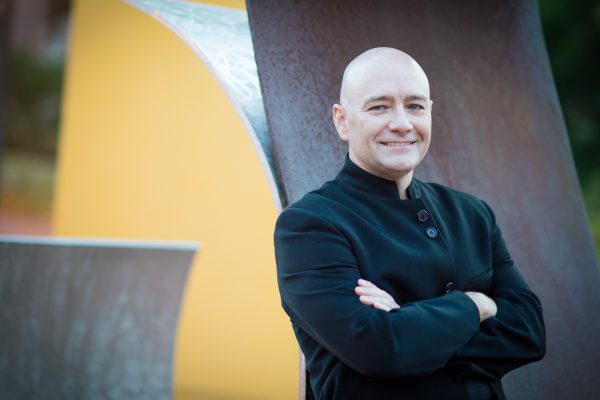 How do you see the community playing a part in the role of the Wheeling Symphony’s music director?
How do you see the community playing a part in the role of the Wheeling Symphony’s music director?
An orchestra is, above all, a community service organization. Without a community to serve, an orchestra has no purpose. Without the community’s support, an orchestra can’t survive. Therefore, I believe what goes on in an orchestra should be the result of a two-way conversation. Music directors should be tuned-in to what their communities need and want, as well as what bolsters the musicians artistically, and what makes logistical and fiscal sense for their administrations. One of the most important aspects of music directorship is listening to feedback from the audience (and musicians and administration), seeking guidance from all parties involved, and making wise decisions that strengthen binds between the orchestra and the community. It’s called good leadership.
Who is your favorite composer? Why?
There are so many greats — and they are all great in different ways — so I have a lot of favorites. It sounds cheeky, but my favorite composer is whoever I’m studying at any given moment. I can say I have a real affinity for Beethoven (who doesn’t?), Brahms, Tchaikovsky, Mahler, Puccini, Stravinsky and many others. Right now, I’m neck-deep in the music of Mozart, Ravel, Debussy and Johann Strauss Jr., so I guess they’re my favorites today. I’ve also been quite taken lately by the music of Lili Boulanger, who I happen to be researching at the moment. She is a marvelous, if relatively unknown, French composer from the beginning of the 20th century. There is also a handful of living composers whose music I’m infatuated with, including Kenneth Fuchs, whose amazing overture United Artists I’ll conduct in Wheeling on May 17.
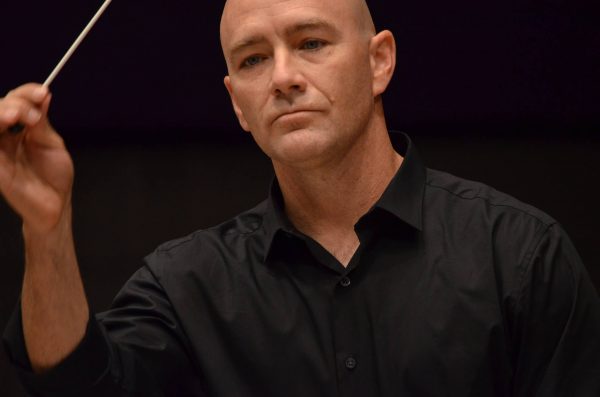 What’s your favorite non-classical music style?
What’s your favorite non-classical music style?
I have eclectic tastes and enjoy a lot of styles, but there’s still a soft spot in my heart (and a button on my car stereo) for 1980s rock-n-roll. After ’80s rock, I think my second most favorite (non-classical) musical style is 1940s big band. I love Glenn Miller, Tommy Dorsey, Artie Shaw, Benny Goodman, etc. The blues! As a guitarist, Stevie Ray Vaughan is an idol of mine, and I grew up listening to B.B. King. And old-school country music like Willie Nelson (“Wayland, Willie and the boys”). Did I mention I’m from Texas?
What’s on your current playlist?
My playlist is definitely not the music I’m conducting soon. After I’ve made important decisions about the interpretation of a piece of music, I might listen to a few different recordings of it. My playlists on Pandora include French Cafe Radio, Big Band Radio, the Stevie Ray Vaughan channel and Dinner Party Radio (a great mix of Frank Sinatra, Dean Martin, Louis Armstrong, Billie Holiday, etc.). On Sirius XM, I like Symphony Hall, 40s Junction, Siriusly Sinatra, 80s on 8, and (don’t judge!) Hair Nation.
What else would you like to share with Weelunk readers?
I am so flattered and excited to have been selected as a finalist for the Wheeling Symphony Orchestra’s music director search. My wife Taylor and I are excited to get to know Wheeling and the community, and I can’t wait to make music with that great orchestra. See you there!
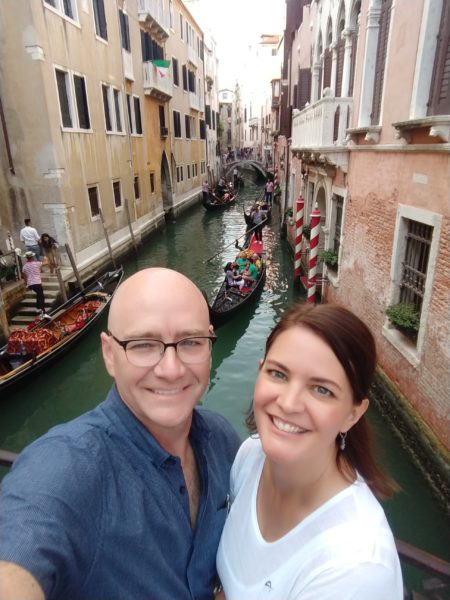
For more information about the Wheeling Symphony Orchestra concert, read the recent Weelunk story about “Superheroes!”


